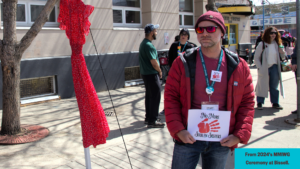Highway 16 running through parts of north-central Alberta and into mainland British Columbia has a second, more ominous name that’s recognizable to most — the Highway of Tears. This stretch of highway was given this name because of the number of Indigenous Women, Girls, 2-Spirit People, and countless others rooted in Indigenous Nations who were either murdered and found along this highway or went missing while along this highway.
There have been initiatives like the National Inquiry into Missing and Murdered Indigenous Women and Girls (MMIWG) that have made great strides to address this issue and educate the public. But, in 2011 a young woman and her father launched their own awareness campaign from people who have their own roots with Indigenous Nations.
Addressing MMIWG from a lived-Indigenous experience
Raven Lacerte and her father Paul started the Moose Hide Campaign and included one distinct symbol as a commitment to ending gender-based and Indigenous targeted violence — wearing a pinned square of moose hide.
To this day, the Moose Hide Campaign organization distributes these pins along with information cards as a gift of medicine. Adding to the Indigenous lens, the website suggests a $1 donation when ordering gifts of medicine as a gift of reciprocity and helping to ensure the Moose Hide Campaign remains sustainable.
Moose Hide Campaign’s main awareness event is its walk in Victoria, British Columbia, on May 15 — but this is far from the only Moose Hide Campaign event. Dozens of individual walks are happening across the country, including one in Edmonton at City Hall.
In addition to the walks, it’s also encouraged to fast as part of this awareness campaign. In many Indigenous Nations and communities, fasting is seen as a symbol of your commitment and a way to deepen your intention towards this commitment. It’s encouraged, but not required, to fast from sunrise to sunset to further solidify your resolve.
Moose Hide Campaign events and how you can get involved
This is a very-high level overview of this immensely impactful movement. The wisdom and knowledge shared by the Lacerte family and the rest of the Moose Hide Campaign team illuminates many of the issues faced by women, girls, 2-Spirit Peoples, and other Indigenous Peoples while firmly rooted in Indigenous culture and community — an important perspective for us all to listen to and gain a better understanding from.
Discover more about the Moose Hide Campaign and how you can showcase your commitment to ending gender-based and Indigenous Peoples targeted violence at Edmonton City Hall.
The 2020s has been an important decade for Canada’s relationship with the Indigenous Nations. We’re seeing large institutions like Canada’s federal government acknowledge and recognize the atrocities committed against Indigenous Peoples.
One incredibly important stride forward was the publishing of the Final Report from the National Inquiry into Missing and Murdered Indigenous Women and Girls (MMIWG). This more than 700-page report highlights interviews with more than 2,300 people affected by violence against Indigenous People.
These stories illustrate the challenges faced by women and girls, and the continued violence against members of the 2SLGBTQIA+ community. By reading this document, we can gain better knowledge on the marginalization experienced by Indigenous Peoples — and ultimately, have the wisdom and perspective to know what we can each do individually to help create a more equitable world.

The Four Key Areas of Rights for Indigenous Peoples
In addition to the 231 recommendations the report makes to help end violence and marginalization against Indigenous Peoples, it highlights four key areas of rights for Indigenous Peoples and provides explanations as to how each help work towards this goal of ending violence:
- Right to Culture – this right specifically highlights previous generations trying to assimilate Indigenous Cultures and Nations and how these efforts created the foundation for the marginalization Indigenous Peoples continue to experience today.
- Right to Health – this highlights how all people within Canada have the right to access health care. For countless people rooted in Indigenous Nations, this is an area where they have experienced discrimination — this barrier to health care further adds to the violence experienced by Indigenous Peoples.
- Right to Security – countless stories shared through this national inquiry demonstrated the near constant threat Indigenous Peoples face while living day-to-day. And it’s not only physical security: emotional, mental, social, and cultural security are all key to ending this disproportionate violence.
- Right to Justice – experiences through Canada’s justice system can be incredibly inconsistent for Indigenous Peoples. These disconnections through Canada’s justice system can further perpetuate the violent experiences of Indigenous Peoples.
Why Education is Foundational to Ending Violence
While the 231 recommendations and the four key areas of rights largely focus on larger-scale systemic changes, that doesn’t mean everyday people are powerless to help steer this change along.
In fact, just being more aware of the kind of violence that Indigenous Peoples are facing is the perfect foundation needed to see the kind of change that will help end this violence.
Any meaningful action starts with awareness and education. With the knowledge and wisdom of the issues, their roots causes, and what needs to be done to address this inequity, the better you can direct your own actions to be more equitable to people rooted in Indigenous Nations.
And the more people there are who fully understand the issues and how to direct their own actions, the more forward momentum we can see to finally seeing an end to this disproportionate violence.

